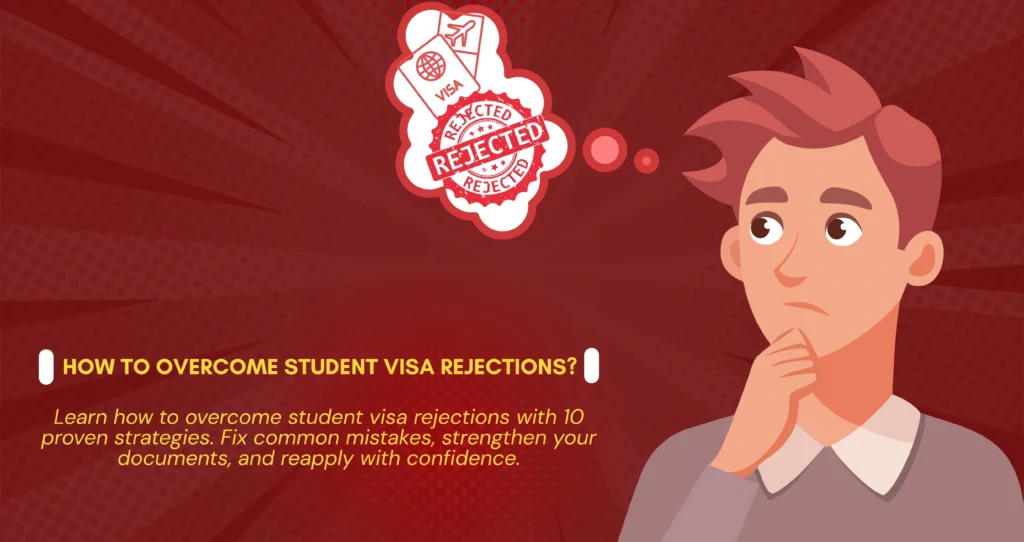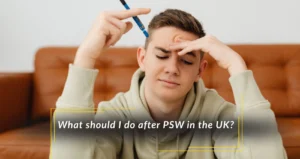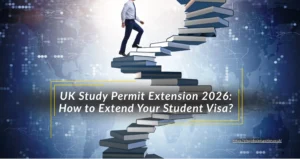Although a student visa rejection can feel like a major setback, it doesn’t mean the end of your study abroad dream. Most rejections occur due to correctable errors, such as unclear documents, weak statements, or a lack of financial transparency. With the right guidance and preparation, you can transform a past refusal into a successful reapplication.
Below are 10 proven strategies to overcome common reasons for visa rejection and increase your chances of approval the next time you apply.
Table of Contents
Toggle1. Strengthen Your Financial Evidence
Financial proof is one of the main reasons for visa refusals, but it’s also the easiest issue to solve.
- Maintain a consistent bank balance that shows you have funds for tuition, health insurance, and one year of living costs. Avoid making large deposits all at once.
- If you have a sponsor, submit their bank statements, tax records, and proof of your relationship.
- Use official education loans or fixed deposits from verified banks.
- Prepare a clear and concise financial summary letter that explains your funding sources.
It is better to open and maintain your account for at least three to six months before applying.
2. Demonstrate Genuine Study Intent
Visa officers must be convinced that you are a genuine student and not an immigrant seeking to enter the country illegally. This is a major factor in the student visa interview at the embassy.
- Choose a course of study that aligns with your academic and career goals. If you have an offer letter for a different course that does not align with your previous education or work experience, you may be denied a visa.
- Write a powerful statement of purpose explaining your goals, the reasons you chose the country and university, and how they fit into your career plans.
- Demonstrate your ties to your home country, such as family, future job plans, property ownership, or community engagement.
- Be prepared for interview questions such as: “Why this course?” and “What will you do after graduation?”
- Be natural, confident, and honest during your visa interview.
3. Ensure Document Accuracy and Authenticity
One incorrect entry can result in automatic rejection. This can result in a lengthy suspension for possessing fake documents.
- Double-check all documents for accuracy, including name spellings, dates, and references.
- Only submit genuine documents – fake or altered documents result in long-term bans.
- Maintain consistency in the documents submitted for your application, statement of purpose (SOP), and financial forms.
- Renew outdated documents, such as IELTS scores or bank statements, before submitting them.
4. Improve Academic and Language Qualifications
Strong academic and English scores demonstrate your preparedness for studying abroad. It is mandatory to have an English language proficiency test result for studying abroad.
Follow these steps to overcome this requirement.
- Take the English proficiency tests (IELTS, TOEFL, Duolingo, or PTE) again to improve your score.
- In your SOP, highlight your academic achievements and certifications.
- If your GPA is below the entry requirements, enroll in foundation or pre-master’s programs.
- Join STS English Academy to improve your test-taking skills and academic writing.
5. Apply Early and Follow Every Step Carefully
Incomplete or late applications often result in unnecessary rejections. Some applicants will even need to withdraw their visa applications before a decision is made. This is because the arrival date mentioned in the offer letter from the university is about to expire.
How to Overcome:
- Apply at least three months before your intake date.
- Track the following visa steps: tuition deposit, CAS/I-20, SEVIS, biometrics, and health checks.
- Make sure you use the correct visa category (e.g., F-1 for the U.S. and Tier 4/Student Route for the UK).
- Set calendar reminders to avoid missing embassy or university deadlines.
6. Address Previous Immigration Issues
If you have had a visa refusal or overstayed in the past, it is important to be transparent.
Here’s how to overcome them:
- Disclose any past rejections in your new application.
- Include a letter explaining what went wrong and how you corrected it.
- Provide stronger evidence of financial stability, academic qualifications, or intent than you did in your previous attempt.
- Demonstrate a clean travel history and strictly adhere to all future visa regulations.
7. Resolve Criminal or Security Concerns
A visa can be denied due to even minor legal issues. You can overcome this by submitting a police clearance certificate or a criminal background check. If relevant, provide supporting letters from employers, community leaders, or legal authorities. Above all, be honest – hiding a criminal record can result in a permanent ban.
8. Complete All Medical and Health Requirements
Many countries require health clearance before approving a visa.
How to overcome this requirement:
- Schedule medical checkups early at clinics approved by the embassy.
- Keep copies of your vaccination and test results.
- Address any flagged health issues with certified medical documents.
9. Choose Accredited Universities and Relevant Courses
Studying at a recognised institution builds credibility.
How to overcome this requirement:
- Only apply to government-accredited universities or reputable private colleges.
- Avoid agents offering “easy admission” or diploma mills.
- Select a course of study that builds on your past education or work experience.
- Include the university’s ranking, reputation, and program relevance in your statement of purpose (SOP).
- STS Global Education partners with over 100 recognized universities worldwide. Contact us to find the best country, course, or university for your career goals.
10. Avoid Suspicious Travel Patterns
Applying for multiple visas at once can make you appear untrustworthy. Instead, apply to one country at a time and provide genuine reasons for your choice. Provide a clear statement detailing your travel history and explaining previous trips. For every past or planned travel, use a valid educational or professional reason.
Visa rejections are not permanent; they’re simply opportunities to prepare better. By addressing your weaknesses and improving your documents, intentions, and communication, you can turn a rejection into an approval the next time around.
At STS Global Education, we specialise in identifying the reasons behind rejections and helping students overcome them. From financial planning to mock visa interviews, our expert counsellors will ensure that your application meets every embassy standard.
FAQs
Can I reapply immediately after a visa rejection?
Yes, but only after you’ve addressed the issues that caused the rejection. Rushing to reapply without making changes may result in another rejection. It’s best to wait four to eight weeks and improve your documents.
Should I mention my previous rejection in a new application?
Yes, absolutely. Hiding a past rejection may be considered misrepresentation. Be transparent and include a short letter explaining how you have improved.
Does a scholarship increase visa approval chances?
Scholarships can help by showing academic excellence and financial stability, which strengthen your credibility. However, they don’t guarantee visa approval.
How do I overcome a 214(b) visa refusal (U.S.)?
Demonstrate stronger ties to your home country, improved financial evidence, and a clear academic purpose. Practice your answers before the interview, and make sure that all of your documents demonstrate your intent to return home after your studies.
How do I overcome an F-1 visa rejection?
Analyze the reason for your refusal, prepare a better statement of purpose (SOP), and practice for your next interview. Focus on demonstrating the relevance of your course, providing financial proof, and explaining your post-study plans.
How should I answer visa refusal questions in a reapplication interview?
Be honest and concise. Explain why your previous application was refused, what has changed, and why your new application is stronger.
How should I answer “Why should I approve your visa?
Emphasize your academic goals, financial stability, and intention to return after your studies. Show confidence and preparedness.
Does applying for the diversity visa lottery affect my student visa chances?
No, it doesn’t directly affect student visas. However, if it suggests long-term migration intent, you should clearly explain your academic purpose.
Can DS-160 form errors cause a U.S. visa rejection?
Yes, incorrect or inconsistent answers can lead to automatic rejection. Always review every detail before submitting.
Can professional guidance really improve my chances?
Yes. Partnering with an experienced consultancy like STS Global Education ensures that your application meets embassy standards, which reduces the risk of rejection and helps you present your profile with confidence.




